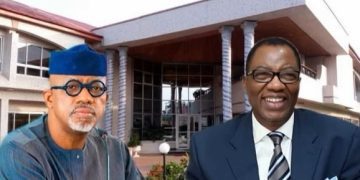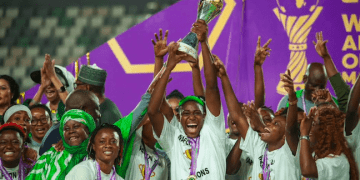Food sufficiency and security has been one of our major problems and despite so many previous government programmes in Agriculture, it appears we are yet to find a sustainable way to ensure food sufficiency and food security. Tinubu apparently has come to understand that having sufficient food for Nigeria does not start and end with giving loans to farmers. In the absence of a permanent institutional foundation, we will continue to hover in circles with no sustainable solution in sight
By Michael Chibuzo
This man called President Bola Ahmed Tinubu is painstakingly doing an architectural redesign of Nigeria’s economic foundations. He has chosen to be the scapegoat and anyone who understands Nigeria’s structural problems should be grateful that a Bola Tinubu is President of Nigeria today. This is a President who appears not to be bothered about re-election politics and moves like one ready to sacrifice his immediate personal political interests for the long-term health and survival of his dear country.
At the moment and in the foreseeable future, his attempt to solidify the foundation of this federalist state called Nigeria would bring about pains – a lot of it actually. It took us long to enter into the ditch, we must not expect to get of the ditch overnight or in four years. To cure this pain, we must finish the treatment. We must not stop halfway. The World Bank, an institution we love to hate, said this much recently. And they are very right on this.
It takes a President who is not afraid to lose elections to do the unpalatable foundation jobs required to fix Nigeria. President Bola Tinubu has continued to lay the institutional foundations that many feel are impossible or suicidal to pull off. I will enumerate some of the major ones, which justify why I so much believe in the abilities of President Bola Tinubu to succeed – it’s not a blind faith.
Tax and Fiscal Reforms: This was one of Tinubu’s earliest moves. Just like what Tinubu did when he became Lagos governor, his first major policy move was to reform the revenue and tax administration system in Nigeria. He set up the Tax and Fiscal policy Reforms committee headed by Taiwo Oyedele and in less than a year they delivered a great job, which has metamorphosed into the Economic Stabilisation Bills (ESB) currently before the NASS.
Through these bills, Tinubu wants to amend about 15 different tax, fiscal, and establishment laws to facilitate economic stability and set the country on the path for sustained inclusive growth. On Oct 3, the President forwarded four executive bills to the NASS.
These bills are the Nigeria Tax Bill, Nigeria Tax Administration Act (Amendment) bill; Nigeria Revenue Service Bill and Joint Revenue Board (Establishment ) Bill. When passed into law, these bills would among other things help to harmonize the multiple tax laws in the country with the big one being the stripping of Customs, NIMASA, Immigration, NPA and other revenue generating agencies the powers to collect revenues. Revenue collection through NRS would reduce the cost of collection drastically and increase efficiency of revenue collection by blocking many leakages and applying centralised innovations.
Customs and co would be made to focus on their core duties. FIRS would be rebranded to Nigeria Revenue Service (NRS) which would collect all taxes that should go to the federation account. Each tier of government would then get its own share. In fact Tinubu wants FG’s share of VAT revenue to shrink to 10% from the current 15%. He wants the subnationals to have more revenue to finance new powers donated to them in the second schedule of the 1999 constitution (as amended). Most importantly, these tax reforms would see 90% of income earners and small businesses in Nigeria being exempted from taxes. In another clime, this would be celebrated a landmark legacy.
Full deregulation of PMS: Despite the accompanying enormous discomfort on many aspects of our economic life, President Tinubu has been focused on achieving full deregulation of the downstream oil sector. It appears that he has achieved this milestone because today, Dangote Refinery is selling PMS to any willing buyer. NNPC Ltd is no longer the sole off taker of PMS from Dangote Refinery neither are they the sole importer of the product. NNPC is selling PMS and other petroleum products at the prevailing market prices.
It took a while to get to this point, but so far in October petrol imports into Nigeria has reduced by 80%. It means by the end of this year we would likely become totally self-sufficient in PMS and be exporting excess. The best way to tackle corruption is to eliminate the incentive fueling the corruption.
The subsidy regime, no matter how one wanted to manage it, was always bound to open opportunities for corruption and shortchanging of the public purse by those in the system either through opaque crude oil swap or cost under-recovery by the NNPC Ltd. Cross border smuggling of PMS from Nigeria to our neighbouring African countries would not stop totally for some reasons, but it would no longer be a drain on Nigeria’s public purse.
CNG Revolution: The full deregulation of the downstream oil sector has invariably made CNG to become a much more attractive proposition with many now seeing it as an alternative they must embrace because it is way cheaper. Some argue that CNG alternatives should have been put in place before PMS subsidy was removed but it’s not that straightforward.
Once PMS was still cheaper than CNG, there is little incentive for people to convert their cars to run on CNG. The cost of conversion of vehicles to able to run on CNG is relatively high. Meanwhile, as long as FG was still shouldering PMS subsidy burden, it would not have the revenue to finance any CNG initiative on a meaningful scale. Therefore, so long as subsidy still kept PMS prices below that of CNG or marginally above it, the CNG revolution would not have started.
The Buhari administration around 2020 or 2021 tried the Auto gas initiative (which includes CNG adoption) as he moved towards full PMS deregulation. But there was limited success in the CNG component as adoption was not widespread. Before the subsidy removal, what was happening basically was that manufacturing firms started adopting CNG to provide electricity for their firms instead of using diesel (deregulated since 2004), whose price was skyrocketing.
Today, CNG is becoming popular with many vehicle owners eager to switch from PMS to CNG. FG is stimulating this switch as well through the setting up of many conversion workshops across many cities and offering subsidised conversion fees by @PCNGInitiative. This increasing demand for CNG has encouraged CNG market leaders in Nigeria such as NIPCO, in partnership with the FG, to invest more in establishing CNG refuelling stations. In a couple of years, CNG filling stations would definitely become common across the country.
Student Loans: Tinubu against all odds has also activated the student loans programme and institutionalised it. In one of the executive economic stabilisation bills President Tinubu sent to the NASS, special provision was made to guarantee and increase the source of funding available for the student loans programme just like TETFUND, UBEC fund and Basic Health Care Provision Fund get funds from guaranteed deductions from the consolidated revenue fund of the federation.
The student loan scheme, administered by @NELFUND at zero interest rate, is fast becoming a life saver for many students especially in these very difficult economic times. This can only be a product of deliberate thinking, which of course Tinubu is known for.
Consumer Credit Scheme: This is another institutional policy of President Bola Tinubu, which just like the student loan, has a backing of an Act of Parliament. It is a revolutionary tool administered by @CrediCorpNG that will give income earners an opportunity to purchase goods and services they need but cannot afford to pay for at once with a lump sum.
The scheme has kicked off with civil servants who have a verified income and employment history. Thousands of beneficiaries are already getting their funds at very concessionary interest rates. Eventually, the scheme will be extended to other income earners who are not civil servants.
This would unlock a huge demand for goods and services that would been impossible without a cheap consumer credit scheme.
Monetary Policy Reforms: President Bola Tinubu took the unpopular but inevitable route of allowing the Naira to float while scrapping the multiple exchange rate windows the @cenbank put in place since 2017 as it desperately tried to manage FX demand and supply. Cardoso’s FX policy was just like returning to the basics – allowing demand and supply to determine rates. The monetary reset came with so much pains and Nigerians are still reeling from the effects in the form of high prices of goods and services. However, that was the only way forward.
We need to face our demons and accept our realities, which would enable us claw ourselves out of dark tunnels. Tinubu has always faced challenges headlong and on this FX issue, he allowed the CBN to face it boldly. Our reality is that we don’t have abundant FX reserves to peg the Naira to a rate that would lower cost of imports, so there is little we can do in the interim other than to allow the market determine the rate.
Not pegging the Naira is costly, however pegging it when you do not have enough FX to saturate the market is suicidal. Today, despite the pains it brought, we can see visible improvements. Currently, our gross foreign reserves is close to $39 billion up from $34 billion in May 2023. This is in spite of the CBN’s liquidation of over $6 billion FX backlog within months. It is important we stay this course and target further accretion of the foreign reserves, possibly to over $60 billion by 2027.
Agriculture: Food sufficiency and security has been one of our major problems and despite so many previous government programmes in Agriculture, it appears we are yet to find a sustainable way to ensure food sufficiency and food security. Tinubu apparently has come to understand that having sufficient food for Nigeria does not start and end with giving loans to farmers. In the absence of a permanent institutional foundation, we will continue to hover in circles with no sustainable solution in sight.
Agriculture is one of the few areas where the three tiers of government are constitutionally empowered to operate in. For Nigeria to achieve food security, the FG, states and LGAs MUST be seriously invested in agriculture. No matter what FG does, if the 36 states and 768 LGAs in those states do not deliberately take agriculture serious, Nigeria will never achieve food sufficiency.
So, what is the Tinubu administration doing in agriculture? Apart from the expected FG interventions in the form of inputs and implements to commercial farmers for both the wet season and dry season farming in the major agricultural belts of the country, the Tinubu administration has began the groundwork, though not very visible at this time, for deepening mechanised agriculture across the country as well as storage and agro processing.
Under Tinubu, the federal government through @NGfmafs wants to recalibrate how support is extended to farmers in a manner that yields commensurate value and which is sustainable. This is why Tinubu approved four projects/programmes under the agriculture mechanisation programme which include:
Greener Hope Programme, a $1 billion PPP arrangement where FG will provide $200 million counterpart fund (already approved by FEC). Under this programme, 1,000 agro-service centres will be established across farming belts to provide essential services including tractor hiring services and aggregation services (both at the input purchase and produce sale levels), among others. This will enable those small-holder farmers that may not be able to afford tractors to hire or lease a tractor to do their farm preparations and also be part of an aggregation cluster to get better value when selling their produce or purchasing farm inputs.
To be continued …
•Opinions, thoughts or positions expressed here are personal and strictly of the writer/author and not The Daily Crucible.









































